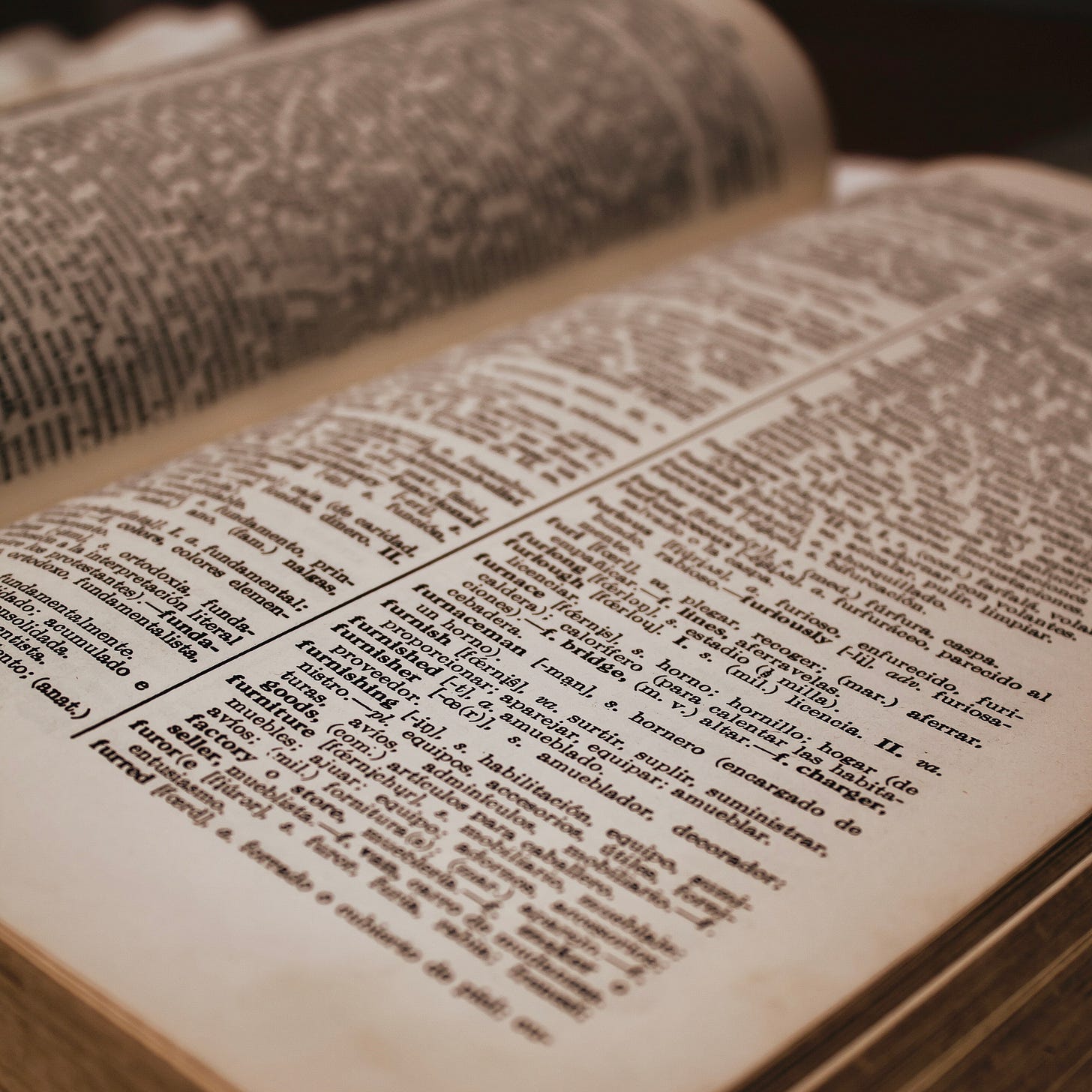I’d been flailing for a while. It was still very dark. Though I avoided checking, I guessed it was around 4:00 a.m., the typical time for my sleep-cycle shenanigans. I was grateful to feel my body finally settling back into the mattress, the restlessness leaving bit by bit. I had nearly drifted off - that’s what I’m telling myself, anyway - with no apparent thoughts still running amok in my head. Until suddenly, a word. Just one. It was as though someone put their face next to my ear and spoke. I heard it clearly.
“Consequentially.”
“Wait, what?” My semi-conscious brain needed a second to reconnect.
“Consequentially.”
“Is that even a word? Don’t you mean consequently?”
Great. Now I was having a conversation with myself, at 0-dark-thirty, about a word my mind had conjured up out of nowhere.
“Who does this?” I thought, promising myself to look it up in the morning.
Surprisingly, I did get a few more hours of shut-eye that night, and as hoped, remembered the incident come daylight.
An online search revealed that consequentially isn’t in the Cambridge Dictionary, yet. I liked that the door was left open for an addition someday, but mentally, a fail-buzzer went off. Merriam-Webster, on the other hand, indicated that the word has been around since the 17th century, that it means the nature of a secondary result, that it is related to consequence and has to do with importance or significance. The Oxford Learner’s Dictionary concurred and added “in a way that is important or that will have important results.” Access to the digital version of the Oxford English Dictionary is limited to subscribers, which I am not, so that was the end of that.
I was unconvinced. To me, it sounded like a sniglet. Those who were of HBO-watching age in the 80s will remember Not Necessarily the News during which comedian Rich Hall introduced “words that aren’t in the dictionary but should be.” The Washington Post picked up the tradition in the early 2000s with the "Style Invitational," a column it ran until December last year, at which point the popular piece was unceremoniously dropped. Happily, it has reemerged, with its original leaders back in action, over at
.My word seemed like exactly the sort that would turn up in places like that. I crafted my own definition. Consequentially: adverb. /ˌkɒnsɪˈkwenʃəli/ /ˌkɑːnsɪˈkwenʃəli/ - related to the domino effect that happens when a questionable decision goes pear-shaped. Like the time my brother, frustrated at not being able to land a basket, threw a chunk of brick at the ball, only to have it bounce off, fly up, and hit him in the head.
The day after my wordian angel came to me, I spent more than a few minutes in sniglet mode, cracking myself up with wordplay. A curmidgeon, I decided, is a pint-sized version of a cranky, old adult, a toddler in the throes of the terrible twos. Erectify is the corrective result of taking Viagra. A malcontint never finds a suitable hair color. And, someone who eats to the point of feeling sick is dreadfull.
Eventually, I meandered back to bona fide words, in so far as that term can be used to describe of any aspect of language. What makes a word real, after all? Though inclusion in a dictionary validates the existence of certain words, selection and definition are subject to impartiality, omission, and changes brought with time and lived experience.
This, in fact, is the premise of Pip Williams’ 2021 novel, The Dictionary of Lost Words, a book I highly recommend. Through the fictional main character, Esme, the author explores the very real influence of gender bias and human error on the words included in - and omitted from - the Oxford University Press’s New English Dictionary, now the Oxford English Dictionary (OED).
Published in its entirety in 1928, 50 years after its compilation began, the OED did not undergo another major revision for seven decades. Imagine how much the English language had evolved by then, and how the exponential transformation of our world informed those changes!
Language is the architecture of communication. It reflects historical foundations, popular styles, emerging designs, and modern innovations. It is dynamic. As much as we learn from it, it learns from us. Potent and provocative, it is a tool with equal capacity to build or destroy, depending on how we use it.
And that, friends, is the topic of next week’s post. In the meantime, have some fun with a few words you might not know were words.
Overmorrow
The day after or following tomorrow. Use: I’m going to stop eating so much overmorrow.
Yerk
To beat vigorously (as in thrash); to attack or excite (as in goad). Use: You are such a malcontint that it makes me want to yerk you.
Aubade
A morning love song - as opposed to a serenade, which is intended for performance in the evening. Use: I was totally into this dude until he rolled up at 0-dark-thirty blasting that Kendrick Lamar aubade.
Quidnunc
A person who seeks to know all the latest news or gossip. A busybody. Use: Grapevine, schmapevine. Marvin Gaye must have had a real quidnunc in his neighborhood.
Nibling
The gender-neutral term for nieces or nephews. Use: I’m dreadfull and the niblings dinking around under the table aren’t helping.
Cachinnate
To laugh very, very loudly. (We all have that one friend. Or maybe it’s us!) Use: The pick-up line was so lame that she began to cachinnate uncontrollably.
Shivviness
Derived from shiv, an old English word meaning a tiny fragment of something or a loose thread, it is the uncomfortable feeling caused by wearing new underwear. Use: I’d rather wear Fruit of the Looms with holes in the back than deal with the shivviness of my new Calvin Kleins.
Wabbit
A Scottish term for being exhausted. Use: Lately, I’ve spent so much time scratching my loins that I’m plumb wabbit.
Schnapsidee
German word for a crazy or impractical idea that seems ingenious when you’re drunk. Use: Riding her skateboard on the slide was a total Schnapsidee, consequentially she’s got a cast on her arm.
~Elizabeth







Hahahahahahaha 🤣. I hereby give you a word my father created: transmeridiandyschronesia … go
Oh I love singlets!! How about potentater? Mashed, fried or simply baked, it’s the king’s favorite side dish. 😉